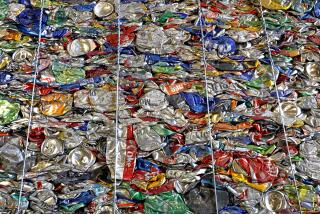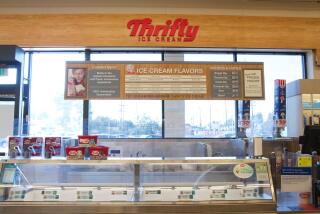Here’s a Sweet Deal: Trade In Old Phone Books for Ice Cream
- Share via
It was only 9:25 Tuesday morning and Supervisor Mike Antonovich was eating a vanilla ice-cream cone.
The oddly timed indulgence was not a new food kick for the health-conscious politician. Instead, it was the climax of a news conference kicking off a new recycling program for northeastern Los Angeles.
Between now and May 1, some used telephone directories can be traded for free ice-cream cones at Thrifty Drug stores in Burbank, Eagle Rock, Glendale, Highland Park, La Canada Flintridge, La Crescenta, Montrose, Sunland-Tujunga, Sun Valley and Verdugo City.
There is some fine print, though: Any directories can be recycled in bins outside the stores. But because the program is partly a Donnelley Directory project, which publishes alternative yellow pages in competition with the telephone companies, coupons from soon-to-be-delivered Donnelleys must be presented to receive the cone.
Antonovich heralded the program as an innovative way to benefit both the environment and business. The ice-cream cones, he said, merely “sweeten the deal.”
Jeffrey Moe, director of distribution and environmental issues for Donnelley, estimated that less than half of 1% of landfill waste is made up of telephone directories of any kind. Pacific Bell estimates of discarded phone books are even lower, about 0.05% of the waste stream. County and state waste disposal officials said they had no statistics on discarded telephone directories.
Last year, in the first year of the recycling program, Moe said Donnelley collected 379,000 tons of directories in other Southern California communities, and Thrifty rewarded the recyclers with 25,000 ice-cream cones.
The used directories were exported to Asia--mostly to Taiwan and Singapore--where the paper was used to wrap tropical fruit for export, some of it to the United States.
Since then, however, that market has dried up, and Moe isn’t sure what he’ll do with the directories collected this year. The paper cannot be chopped up and turned back into new Donnelleys, he said, because that would require a complicated and costly de-inking process. Research continues into other possible uses.
In the meantime, Moe said, “there’s really not much we can do with them besides warehouse them and wait.”
More to Read
Sign up for Essential California
The most important California stories and recommendations in your inbox every morning.
You may occasionally receive promotional content from the Los Angeles Times.










